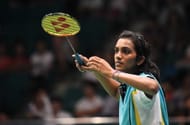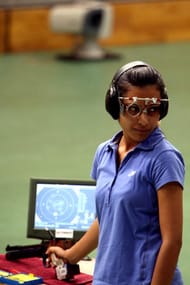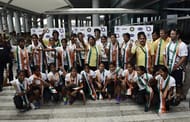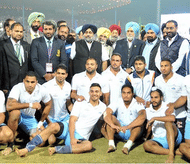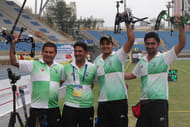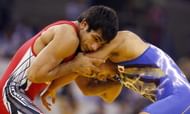As the year 2013 draws to a close, it is time to relive some of the best moments of the year 2013. India as such had some mixed results in the sporting arena – there were some major highs accompanied by some disappointing results along the way.
The highs came in both team sports as well as some of the individual events
Here’s a summary of the men and women who shone the brightest through the year in no particular order.
And you can vote for who you think is the top performer here.
Indian Cricket Team
The Men in Blue have had another successful season under the able stewardship of captain MS Dhoni with the highlight being the Champions Trophy triumph in England.
The team won each of the six Test matches that it played. You could argue that all of them were at home and hence the team was expected to win, but the best teams begin with staying strong at home. The team did that, and convincingly too, with series wins over the Aussies and the West Indies. The latter ended with the retirement of Sachin Tendulkar, but many new faces were unearthed, offering much promise into the future.
Cheteshwar Pujara had a tremendous year notching up two centuries that included a big double century providing solidity at the number three position, vacated by Rahul Dravid. Shikhar Dhawan announced his Test entry with a bang, through a stroke-filled century against the Aussies and Ravichandran Ashwin demonstrated the ability to be India’s lead bowler in home conditions and also added further credibility with the bat towards the end of the season.
The ODI side also performed admirably, winning 22 and losing 10 of their 34 matches in total, with 2 games providing no result. In fact, the team had a better win record abroad and on neutral territory this year, winning 7 of 10 games on the opposition’s home turf and winning all but one of their games on neutral grounds.
They won the Champions Trophy with a perfect record winning every game, including a remarkable fight back in the final against hosts England. Rohit Sharma finally came through on his promise, while Virat Kohli continued his rapid rise up the ODI batting echelons opening the batting and new talents such as Mohammad Shami emerged later in the season.
PV Sindhu
The badminton fraternity found a new face dominating the headlines this year in the form of teenager PV Sindhu who made the rather giant leap from the national scene to the international one winning two Grand Prix Gold titles and making history by winning bronze at the BWF World Championships. What was even more impressive was the fact that she took down former Olympic champion Wang Shixian and reigning World Champion Wang Yihan, both of China, en route to the semi-finals.
Another product of the Gopichand Academy in Hyderabad and tutored under the auspices of national coach Pullela Gopichand.
The lanky Hyderabadi, still just a teenager, caused a ripple when she won the Malaysian Open early on in the season. But, the shockwaves came when she made her way into the semi-finals of the BWF World Championship in Guangzhou, China, where she was assured of a bronze after falling to eventual champion Ratchanok Intanon of Thailand.
The achievement was a monumental one, as it was the first medal for India in women’s singles at the World Championships and it was also just India’s third medal overall after Prakash Padukone’s bronze in men’s singles at Copenhagen in 1983 and Ashwini Ponnappa and Jwala Gutta’s bronze in women’s doubles in the 2011 edition.
She ended the season too on a high with victory at the Macau Open, where she was the top seed and currently sits an impressive 11th in the world rankings after starting the year ranked 25th.
Heena Sidhu
Heena Sidhu made history by becoming the first pistol shooter to win a gold medal at the ISSF World Cup Finals.
And it’s not like she had an easy run in the tournament; she overcame stiff odds by overcoming the challenge of double Olympic champion Guo Wenjun of China, world champion Zorana Arunovic of Serbia and multiple-Olympic medallist Olena Kostevych of Ukraine.
Two Indians had previously won gold medals at the World Cup – Anjali Bhagwat in 2002 and Gagan Narang in 2008 – but both of them had come in the rifle events, making this a first in pistol shooting.
After making a shaky start in the final, she went on to hit 15 consecutive bulls’ eyes to finish with a comfortable lead of 5.2 points over her nearest competitor.
Even more astonishing was the fact that she was not even supposed to be participating at the event, and only received a late call up after two other competitors withdrew at the last minute.
Talk about a dream win!
Women’s hockey teams
The trend of winning a first ever medal in an event was common amongst India’s female athletes this year. The junior hockey girls, achieved something on par with what Sindhu did when they finished the third-best team at their world cup and brought home a bronze medal, which was India’s first medal ever from the competition in Monchengladbach, Germany.
They beat England 3-2 on penalties in the decisive bronze medal playoff match.
The Indian girls proved to be a dangerous outfit right through the competition, surprising many of the top sides and making their way into the final four. They also went one better from the previous edition, where they had made their way to the bronze medal match, only to be pipped by South Korea.
Hockey India deservedly felicitated the achievement by granting a cash bonus of Rs. 1 lakh to each of the players and chief coach Neil Hawgood while the other members of the coaching staff received Rs. 50,000 each.
18-year-old Rani, who was not only the star of the Indian team, but of the whole tournament, vindicated by the Player-of-the-Tournament award bestowed upon her, was awarded a further lakh.
In general, the women outdid the men through the year.
The senior team, despite not picking up any gold, performed admirably in collecting the bronze at the Asia Cup and the silver in the Champions Trophy.
Leander Paes
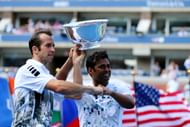
Leander Paes (R) of India and Radek Stepanek of the Czech Republic pose with their trophy after winning their men’s doubles final against Alexander Peya of Austria and Bruno Soares of Brazil at the 2013 US Open
The 40-year old veteran won the US Open mixed doubles title with his Czech partner Radek Stepanek. It was his 8th men’s doubles title in Grand Slams and 14th overall.
Paes and Stepanek clinched their second major title together with a dominant 6-1, 6-3 win over the Austrian-Brazilian pairing of Alexander Peya and Bruno Soares.
The Indian tennis star proved that age is merely a number, collecting his third doubles title at the US Open at the age of 40.
In the other two Slams that they played together, they were bumped out in the first round at the Australian Open and reached the semi-finals at Wimbledon where they went down to Ivan Dodig and Marcelo Melo in a five-set thriller.
They did not play together at the French Open due to Stepanek’s injury, with Paes partnering Austrian Jurgen Melzer instead.
Paes and Stepanek finished the year ranked at No. 7.
Men’s and women’s kabaddi teams
The men’s team won their 4th title in as many World Cups, maintaining their perfect streak with a win over Pakistan. The final this time around wasn’t as easy as in previous editions as the Pakistanis put up a game fight, but the 3-time defending champions edged them out in the end. The tournament has become something of a favourite stomping ground for the kabaddi team and it once again demonstrated that they were still the best in the sport, despite improvement from the other teams over the years.
The women too faced Pakistan, but in their semi-final, and after overcoming the neighbours proceeded to beat New Zealand in the final. This was the second instance of the women’s world cup and India made it a clean sweep of both the trophies by triumphing in this one as well.
Women’s Recurve Archery team
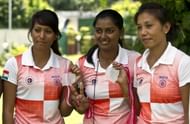
Indian women archers Rimil Buriuly (L), Deepika Kumari (C) and Bombayla Devi pose with their gold medals during a meeting with the V. K. Malhotra President of Archery Association of India in New Delhi on August 27, 2013.
Individually they may not have struck gold, but the famed women’s recurve team as a group performed really well to come out with two gold medals to their name.
India’s leading recurve archer Deepika Kumari, along with Laishram Bombayla Devi and Rimil Buriuly had a highly successful year together as a team.
The trio had bagged gold in the World Cup Stage 3 final in Medellin, Colombia after beating China in the title clash.
They then went on to cause a stunning upset of world and Olympic champions Korea in the World Cup Stage 4 final in Wroclaw, Poland in August.
Deepika Kumari also had a fine year overall individually as she ended the year with seven international medals to her name – three gold, three silver and one bronze.
Deepika’s third gold medal, after the twin team triumphs at the World Cup, came in the mixed team event at the 18th Asian Archery Championship in Chinese Taipei where she went on to win in the company of Jayanta Talukdar, the leading male recurve archer.
She picked up two silvers early in the year at World Cup Stage 1 final in Shanghai, China, in the mixed team event and in the individual category.
The third silver medal came at the prestigious World Cup Final in Paris where she had to settle for silver for a third year in succession as she was edged out by Korea’s Ok-Hee Hyun.
She finished the year ranked No.3 in the individual recurve rankings.
The lone bronze also came with Talukdar at the World Cup Stage 3 final in Medellin, Colombia, in the mixed team event.
Indian Compound Archery team
While the women’s recurve team put up consistent good shows, it was a breakout year for India’s compound archers who emerged from the shadows of their more famous compatriots.
The compound team took inspiration from the women recurve’s world-beating efforts as the trio of Abhishek Verma, Ratan Singh Khuraijam and Sandeep Kumar caused a major upset of their own when they beat the Koreans to take gold in the men’s team event at the Asian Archery Championships in Taipei.
It was the second gold for India in the men’s compound category at the event after an individual gold for IR Sanam at the 2009 edition in Bali.
The team grew from strength to strength through the year and came ever so close to winning a historic gold at the World Cup Stage 2 in Turkey, where the mixed team of Rajat Chauhan and Majudha Soy finished runners-up to the Italian team by a solitary point.
After qualifying third, the team of Chauhan and Soy went on a fairy tale run defeating all before them, that included the likes of fancied nations such as Great Britain, Canada and Russia, to make their first ever final.
Their performance was in fact the saving grace for India at the World Cup Stage 2 as the fancied recurve archers finished empty-handed after a disastrous showing.
At World Cup Stage 3 in Colombia, the men’s team won bronze and at the Asian Youth Championships in Wuxi, China, the team returned with one silver and four bronze medals.
Rajat Chauhan bagged that lone silver in the men’s individual event.
At the Asian Archery Championships, they had another successful run, collecting two gold, one silver and one bronze to further add to their tally. One of those golds, as mentioned earlier, came when the men’s team upset the Koreans. The second came in the mixed category as the team of Abhishek Verma and Lily Chanu beat the Iranians by one point in the title clash
Vijay Kumar Malhotra, President of the Archery Association of India, was unwavering in his praise for the compound archers.
“This year is entirely dedicated to compound archers in view of their brilliant performance in all international competitions attended during 2013 which is a good sign for the preparation of ensuing 2014 Asian Games, Incheon where Compound event has been included for the first time,” said Malhotra.
Indian Wrestlers
At the 2013 Asian Wrestling Championships held in New Delhi, India finished with nine medals overall – two gold, one silver and six bronze.
However, that was good enough only for fifth place overall in the medal standings behind South Korea, Uzbekistan, Japan and China.
In the men’s freestyle though, India finished as the top nation with 48 points, three ahead of Iran who finished second with 45. India finished seventh in men’s Greco-Roman and fourth in women’s freestyle.
Two Amits, Amit Kumar and Amit Kumar Dhankar, won gold in the men’s freestyle 55 kg and 66 kg categories respectively while Bajrang Kumar took bronze in the 60 kg category and Hitender in the 120 kg category.
In women’s freestyle, Vinesh, Babita Kumari, Geetika Jakhar and Jyoti won bronze medals while Navjot Kaur took silver in the 67 kg category.
There was more good news to come for India in the World Championships held at Budapest, Hungary in September. For the first time, India won two medals in the men’s events at the World Championship.
Wrestler Bajrang bagged a bronze in the 60 kg freestyle category with a 9-2 win over Nyam-Ochir Enkhsaikhan of Mongolia which took him to the final. The second medal came from Amit Kumar Dahiya when he won silver in the 55 kg weight category.
The performance meant India scored 23 points at the tournament to finish sixth in the rankings behind Iran, Russia, Georgia, Ukraine and USA and in addition, their performance earned them a first ever berth in the World Cup to be held next year.
“I am very happy with my performance. I was gunning for the gold medal as I had practiced hard for the tournament but unfortunately couldn’t get it due to bad umpiring decision. The referee warned me for not attacking the Iranian and awarded him the point. I was a contender for gold. Nevertheless, I am happy with my performance and overwhelmed by the reception received here,” said Amit.
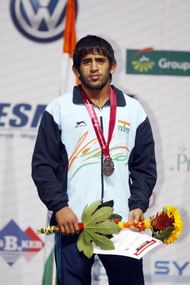
India’s Barjang Barjang celerates his bronze medal on the podium of the men’s free style 60 kg category of the World Wrestling Championships in Budapest
“I am happy to have made the whole country proud. I am happy with my performance. This is India’s best-ever finish in the World Championship,” said Bajrang
Not to be left behind, the Greco-Roman contingent also provided a medal as Sandeep Tulsi Yadav won bronze in the 60 kg category.
Amit received a cash award of Rs. 5 lakh from the Wrestling Federation of India (WFI) while Sandeep and Bajrang each received Rs. 3 lakh.
And in the final major competition of the year, the freestyle men’s wrestlers returned with 14 medals at the Commonwealth Wrestling Championships in Johannesburg to successfully defend their title. They bagged seven gold, four silver and three bronze medals.
Sandeep Tomar (55kg), Jaideep (60kg) and Amit Kumar Dhankar (66kg), Praveen Rana (74kg), Pawan Kumar (84kg) Satyavart Kadian (96kg) and Joginder Kumar (120kg) clinched gold medals in their respective weight categories.
Silver was won by Narender (55kg), Ravinder Singh (60kg), Naresh (84kg) and Rohit Patel (120kg), and bronze went to Arun Kumar (66kg), Pardeep (74kg) and Hardeep (96kg).
The men’s Greco-Roman contingent also came back with a rich haul of seven gold, five silver and two bronze. The women’s team finished runner-up with two gold, four silver and five bronze.
—————————————————————————————————————————————————————
So who do you think was the best performer of the lot? Click here to cast your vote now!
Follow IPL Auction 2025 Live Updates, News & Biddings at Sportskeeda. Get the fastest updates on Mega-Auction and cricket news
